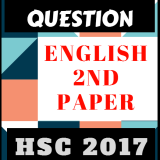Transformation of Simple, Complex and Compound Sentences [SSC, HSC, Admission, Job]
তোমরা যারা JSC, SSC, HSC পরীক্ষাসহ বিভিন্ন ধরনের প্রতিযোগিতামূলক পরীক্ষা যেমন Admission Test, BCS, Bank Job ও অন্যান্য বিভিন্ন ধরনের চাকরির পরীক্ষায় অংশগ্রহণ করার প্রস্তুতি গ্রহণ করছ তাদের সবার জন্যই আমার আজকের এই ভিডিওটি পোস্টটি যাতে তোমরা simple, compound & complex sentence সমূহের সকল regular transformation করার জন্য English Grammar in Bangla এর কিছু শর্টকাট টেকনিক জানতে পারবে।
যে কোন পর্যায়ের second language learners এর জন্যই Transformation একটি গুরুত্বপূর্ণ অধ্যায়। Transformation এর বিভিন্ন প্রকারের মধ্যে Simple, Compound, Complex এর Transformation অন্যতম। কিন্তু আমাদের গ্রামার বইগুলোতে এবিষয়ে এতো সংখ্যক নিয়ম কানুন দেওয়া আছে যে সেগুলো আয়ত্ব করে মনে রাখা তাদের জন্য প্রচন্ড কষ্টসাধ্য হয়ে পড়ে। সেকথা মনে রেখেই আমি এখানে মাত্র ৯টি নিয়মের অধীনে প্রায় সবকটি Simple, Compound, Complex এর Transformation এর নিয়ম সন্নিবেশিত করেছি। আশা করি এই নিয়মগুলো ঠিকভাবে আয়ত্ব করলে এবং অনুশীলন করলে কিছু ব্যতিক্রম ক্ষেত্র ছাড়া Simple, Compound, Complex এর সবগুলো Transformation ই প্রয়োগ করতে পারবে।
Transformation কি?
প্রথমেই আমাদেরকে জানতে হবে transformation কি? Transformation অর্থ পরিবর্তন। Transformation of simple compound and complex sentences এর বেলায় যে পরিবর্তন ঘটে তা মূলত Structural বা গঠনগত।
তো এই স্ট্রাকচারাল পরিবর্তনটি কিভাবে হয়ে থাকে?
জি, এই পরিবর্তনের প্রক্রিয়া বুঝতে গেলে আমাদেরphrase এবং clause সম্পর্কে ভালো ধারণা থাকতে হবে যা তোমরা নিচের ভিডিও থেকে পেতে পারো।
Complex sentence এর গঠন
গঠনগত দিক দিয়ে একটি complex sentence এ অবশ্যই একটি principal clauseথাকবে এবং এক বা একাধিক subordinate clause থাকবে যা principal clause এর সাথে subordinate conjunction এর মাধ্যমে connected থাকবে।যেমন
Compound sentence এর গঠন
অন্যদিকে একটি compound sentence একমপক্ষে দুইটি principal clause coordinate conjunction এর মাধ্যমে connected থাকে এবং coordinate conjunction এর মাধ্যমে connectedহওয়ার ফলে ওই clause দুটিকে coordinate clause বলা হয়ে থাকে। যেমন
Simple sentence এর গঠন
Simple sentence এর ক্ষেত্রে আবার একটি মাত্র clause থাকে তবে simple sentence যে সব সময় ছোট আকারের সুপরিচিত স্ট্রাকচারের হবে তা কিন্তু নয়। সে ক্ষেত্রে basic structure এর পাশাপাশি অতিরিক্ত কিছু শব্দ বা phrase থাকতে পারে যেগুলো transformation ক্ষেত্রে গুরুত্বপূর্ণ ভূমিকা রাখে।
Simple compound ও complex sentence কি এবং কিভাবে চেনা যায়?
Transformation এ কোন ধরনের পরিবর্তন হয়ে থাকে?
এখন আসা যাক, transformation of simple compound and complex sentences এর গুরুত্বপূর্ণ কোন common পরিবর্তনটি ঘটে থাকে যা আমাদের সবসময় মনে রাখতে হবে? Complex sentence থেকে যখন আমরা compound sentence এ রুপান্তর করব তখন complex sentence এ subordinate clause টিতে যে subordinate conjunction বা Linking words থাকে তা উঠে যাবেএবং তার ফলে একটি independent clause এর মত কাজ করতে পারে।এরপরে দুটি clause এর মধ্যে একটি coordinate conjunction যোগ করতে হবে।এরপরে যখন আমরা ওই একই sentence কে simple sentence এ পরিবর্তন করব তখন complex sentence এর sub-ordinate clause-এর subordinate conjunction ও থাকবে না বা compound sentence এর coordinate clause এর coordinate conjunction ও থাকবে না।
তাহলে কি করতে হবে?
Complex এবং Compound sentence এর ক্ষেত্রে কমপক্ষে দুটি Clause থাকে । এখানে আলোচিত Complex Sentence এর Sub-ordinate clause টি পরিবর্তিত হয়ে বিভিন্ন Phrase এ রূপান্তরিত হয়, এবং Sub-ordinate clause এর linker টি উঠে যায়। Compound sentence এর ক্ষেত্রে Coordinating conjunction দিয়ে দুটি clause যুক্ত করা হয়। সেক্ষেত্রে পরিবর্তনগুলো নিচের উদাহরণে ভালভাবে লক্ষ্য করতে হবে। তবে, পাশাপাশি নিচের ভিডিওটি ভালভাবে দেখলে এসম্পর্কিত টোমার সকল প্রশ্নের উত্তর পাবে-
| COMPLEX | COMPOUND | SIMPLE |
|
+but+ | In spite of+ pronoun এর possessive case+Ving/noun |
| 2. Since/as/when (সময়ের ক্ষেত্রে) | +And+ | Ving/Having+V3 |
| 3.Since/as/because(কারনের ক্ষেত্রে) | And+ since/as/because এর পরের subject/ এর pronoun+ | Because of+ pronoun এর possessive case |
| 4. Antecedent + relative pronoun | And + antecedent এর pronoun+ — | Antecedent +Ving |
| 5. If + negative sentence | Imperative or+— | Without +Ving+ বাকী অংশ |
| 6.If+affirmative | Imperative +and+ affirmative | By + Ving |
| 7. +So that+ | And thus | In order to/to+ দ্বিতীয় অংশের মূল verb থেকে বাকী অংশ |
| 8. +So—that+negative clause | +very—and+ বাকী অংশ | +too—to+ মূল verb থেকে বাকী অংশ |
| 9. +So—that+affirmative clause | +very—and+ বাকী অংশ |
+enough—to+মূল verb থেকে বাকী অংশ |
Examples:
1. a) complex: Although/ though he is poor, he is honest.
b) compound: He is poor but (he is) honest
c) simple: In spite of his being poor, he is honest.
2. a) complex: Since/as/when he has come here, we went with him.
b) compound: He has come here and we went with him.
c) simple: he having come here, we went with him.
3. a) complex: Since/as/because he was absent from the meeting, he could not gain the thing.
b) compound: He was absent from the meeting and he could not gain the thing.
c) simple: Because of his being absent from the meeting, he could not gain the thing.
4. a) complex: I saw a man who was working in the field.
b) compound: I saw a man and he was working in the field.
c) simple: I saw a man working in the field.
5. a) complex: If you do not work hard, you will not pass in the exam.
b) compound: Work hard or you will not pass in the exam.
c) simple: Without working hard, you will not pass in the exam.
6. a) complex: If you work hard, you will pass in the exam.
b) compound: Work hard and you will pass in the exam.
c) simple: By working hard you will pass in the exam.
7. a) complex: He worked hard so that he could prosper in life.
b) compound: He worked hard and thus he could prosper in life.
c) simple: He worked hard in order to prosper in life.
8. a) complex: He is so weak that he can not work.
b) compound: He is very weak and he can not work.
c) simple: He is too weak to work.
9. a) complex: He is so strong that he can work hard.
b) compound: He is very strong and he can work hard.
c) simple: He is strong enough to work hard.

✔Lecturer in English at Jhenaidah Cadet College, Jhenaidah, Bangladesh
✔Former Lecturer in English at Uttara University, Dhaka, Bangladesh
✔Content Writer of some of the websites on English Language and Literature
✔Video Content Creator on the YouTube channel, Speak English BD
✔Master Trainer of Continuous Assessment (CA)
✔Translator, NCTB










